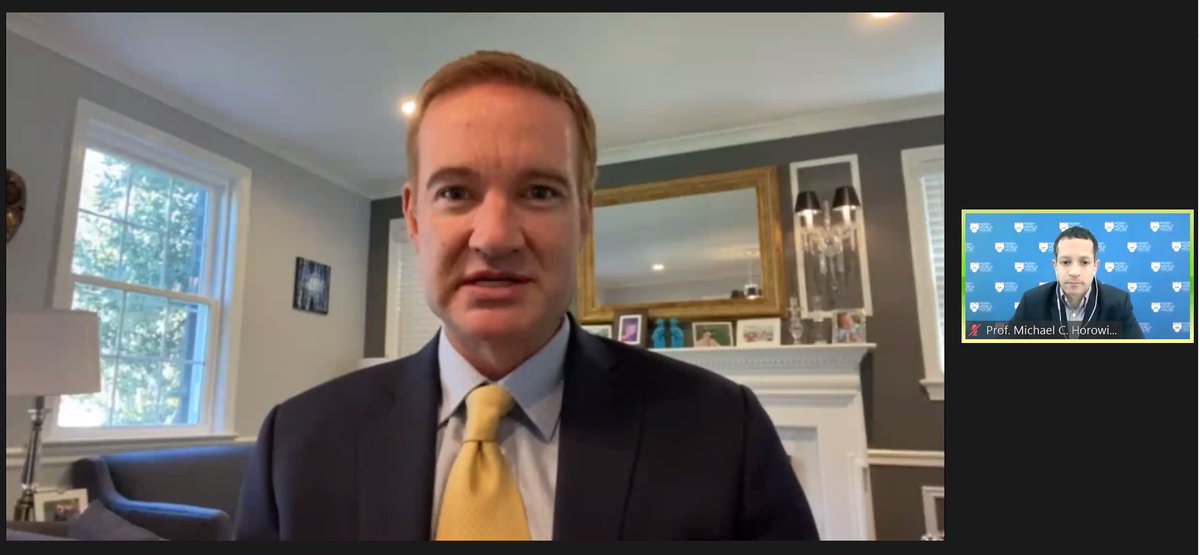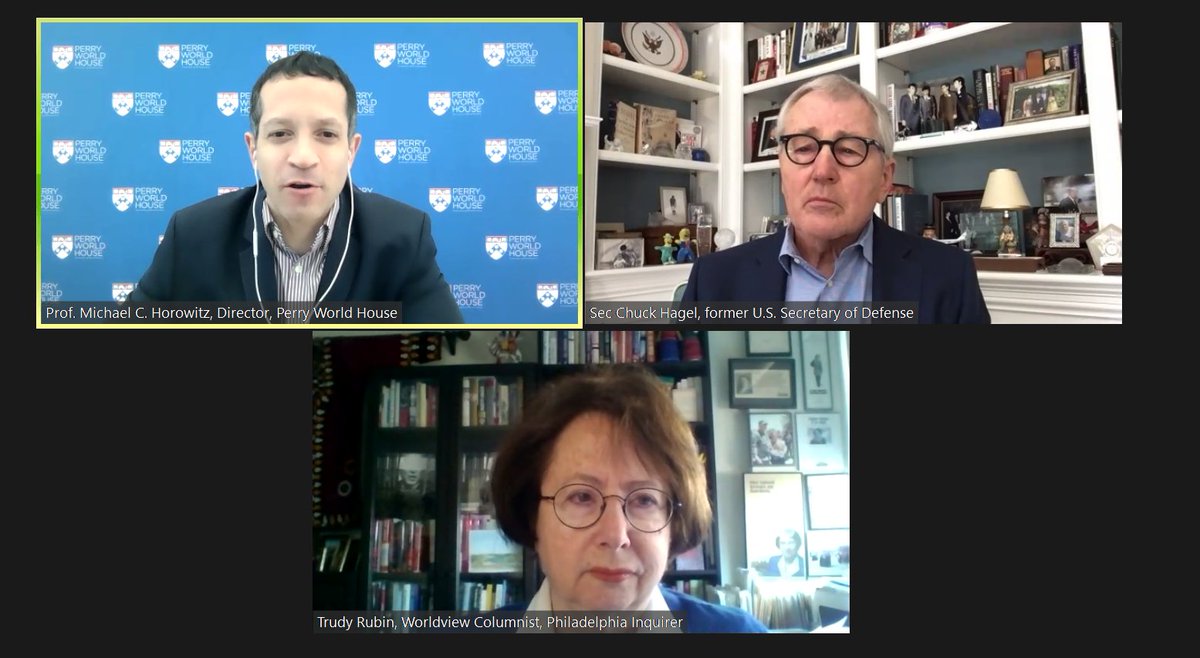We& #39;re now starting coverage of today& #39;s conversation on the future of defense policy with former U.S. SecDef Chuck Hagel and @trudyrubin, following an introduction from @PennBiden& #39;s @mikercarpenter. Follow this thread for updates  https://abs.twimg.com/emoji/v2/... draggable="false" alt="👇" title="Rückhand Zeigefinger nach unten" aria-label="Emoji: Rückhand Zeigefinger nach unten">
https://abs.twimg.com/emoji/v2/... draggable="false" alt="👇" title="Rückhand Zeigefinger nach unten" aria-label="Emoji: Rückhand Zeigefinger nach unten">
"To frame today’s subject, you’ve first got to understand that there is no such thing as status quo in the world," says Secretary Hagel. "The challenges, threats, and opportunities we face don’t stay the same. A nation is not the same as it was yesterday."
"At the same time, we& #39;re living in a world undergoing a renewal, a reevaluation, a rethinking. The world we helped create and lead after WW2, the new liberal world order with international institutions based on the common interests of all people, that’s all in question now."
"We’re currently in the midst of a global pandemic, which has affected everything in our country and the world – economies, security, intelligence gathering and sharing, our culture, our society. And that’s just one dynamic at play."
"China is exploding economically and investing in more military hardware and new technologies. It’s a challenge we didn’t have 10 years ago. Russia & Iran are resurgent, the Middle East in chaos. We’re trying to deal with all this at the same time as rebuilding our own economy."
"No country can be secure if their economy, their society are not secure. Politically, we’re seeing a huge divide and paralysis resulting from it. 1968 was the last time we saw anything like this, but this is far beyond that. Can we rebuild this country in the interest of all?"
"Are major threats to the U.S. now geopolitical – the rise of China and a revanchist Russia? And if so, how do you define the China threat?" asks @trudyrubin.
"Certainly China is part of the equation, but it’s bigger than just China. One of the factors in dealing with China is the strength of our alliances. President Biden has moved on that since taking office. Cyber is also a major threat - it& #39;s an insidious and deadly weapon."
"Cyber makes non-state actors major players, but China, North Korea, Russia are advanced in this. It’s a dynamic we’re facing as the world leader. The world is looking at us and asking if we’re still the world leader - that’s not the message we’ve sent in the last 4 years."
"Are the U.S. and Pentagon ready for tech competition from China?" asks @trudyrubin.
"The US is very much up to this challenge, the resources will be available. Free enterprise and its inventiveness are key – people are the ones who develop new resources, and our people are free and have choices, so I will always have confidence in our kind of system."
"I’m not discounting their power and what they’ve been able to do, but China has been a free economy while not being free politically. At the same time, they’re creating a lot of wealthy people with expectations. Its authoritarian policies will conflict at some point with that."
"China’s strength, resourcefulness, patience are all very strong points, but they’ve got major internal problems as well. The world also does not trust them – you can’t name real friends, partners and allies for China. We need to have confidence in our people, our system."
"There’s much renewed discussion about the ‘Thucydides Trap& #39;: when a rising power collides with a declining power, almost inevitably war results. Are we destined for war with China or is it possible to cooperate without military conflict?" asks @trudyrubin.
"I don’t think war with China is inevitable. It’s possible, we need to be prepared for war, that’s always the case. We have areas of common interest, like climate change. There are ways we can cooperate with China."
"I’ve met Xi and other Chinese leaders in pretty direct conversations where they’ve hinted the US is a declining power, but they know that’s not true. We’ve had our setbacks, but we’re not in decline. So I wouldn’t see that as the current case between China and the US."
"There’s a new book co-authored called & #39;2034: A Novel of the Next World War& #39;, which is about the US and China sliding into a war neither wants in the South China Sea through cyber attack. Is there a danger of cyber war, and is the Pentagon prepared for that kind of war?"
"There& #39;s always a danger of conflict happening like that, and I do think we’re stuck on a 20-year antiterrorism mentality. I say that in full recognition that there are still terrorists out there who want to damage us and our allies."
"We have been consumed with terrorism for the last 20 years - I was the first SecDef who had visited nuclear bases in years - so we have neglected some areas, but we are coming out of that mentality. Cyber is a far bigger threat to this country than ISIS or Al Qaeda."
"Do you see our allies in Europe and Asia being willing to take a strong position in countering an aggressive China?" asks @trudyrubin.
"China has a long arm into Europe – trade, economy, raw materials. While these countries won& #39;t abandon their relationship with the US, they’re looking at it differently than 10 years ago. Part of it is, "can we trust the US? Biden says this now, but who will come after him?""
"So we have to look out for our own future. We need to convince our allies, not just by words but by deeds, and show them we recognize why they have these interests. Biden is qualified to do that, he has a solid, experienced team around him."
"I also think Trump was right on this – he took the wrong approach – but he’s right that we need to ask more of our partners, especially NATO. It is more complicated with our allies in Asia, because they’re right there and have to deal with China in reality."
"Russia is floating the Behring Strait as an alternative trade route to the Suez Canal. Is this a threat?" asks @trudyrubin, turning to audience questions.
"It’s more about the Arctic. I was the first SecDef to implement an Arctic defense strategy, back in 2013 – we’re way behind in that area. China has sophisticated activities there, Russia is reactivating its Soviet era bases. That’s going to be a central area of interest."
Is Chinese-Russian cooperation a problem? "It’s not new. Their common interests are as much driven by damaging the US as much as they can as anything else. I don’t think either side trusts the other, but they’ll accommodate each other’s interests if it’s in their interest too."
Has the US neglected the Med as Russia and China expand investments and military exercises there? "All the time we were consumed with terrorism, locked into unwinnable wars, that gave the Russians and the Chinese free time and space to act. I do think we& #39;ve missed a lot of it."
What demographic changes, like growth rates in African nations, do you see having an impact on the balance of power? "Africa is a very important continent, its resources, its location, its people. We have not paid a lot of attention to it outside of having bases there."
"We’ve done some good things, but we need a whole new strategy for Africa. We have to find a new approach so our African friends can have trust and confidence in us. Our help has been transactional in the past or we& #39;ve led with our military - we have to strengthen diplomacy too."

 Read on Twitter
Read on Twitter " title="We& #39;re now starting coverage of today& #39;s conversation on the future of defense policy with former U.S. SecDef Chuck Hagel and @trudyrubin, following an introduction from @PennBiden& #39;s @mikercarpenter. Follow this thread for updates https://abs.twimg.com/emoji/v2/... draggable="false" alt="👇" title="Rückhand Zeigefinger nach unten" aria-label="Emoji: Rückhand Zeigefinger nach unten">">
" title="We& #39;re now starting coverage of today& #39;s conversation on the future of defense policy with former U.S. SecDef Chuck Hagel and @trudyrubin, following an introduction from @PennBiden& #39;s @mikercarpenter. Follow this thread for updates https://abs.twimg.com/emoji/v2/... draggable="false" alt="👇" title="Rückhand Zeigefinger nach unten" aria-label="Emoji: Rückhand Zeigefinger nach unten">">
 " title="We& #39;re now starting coverage of today& #39;s conversation on the future of defense policy with former U.S. SecDef Chuck Hagel and @trudyrubin, following an introduction from @PennBiden& #39;s @mikercarpenter. Follow this thread for updates https://abs.twimg.com/emoji/v2/... draggable="false" alt="👇" title="Rückhand Zeigefinger nach unten" aria-label="Emoji: Rückhand Zeigefinger nach unten">">
" title="We& #39;re now starting coverage of today& #39;s conversation on the future of defense policy with former U.S. SecDef Chuck Hagel and @trudyrubin, following an introduction from @PennBiden& #39;s @mikercarpenter. Follow this thread for updates https://abs.twimg.com/emoji/v2/... draggable="false" alt="👇" title="Rückhand Zeigefinger nach unten" aria-label="Emoji: Rückhand Zeigefinger nach unten">">






























